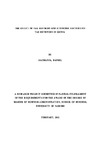| dc.description.abstract | Kenya introduced the tax modernisation programme in 1986 with the hope that this would,
among other things, enhance revenue collection. The objective of this study was to establish
the effect of tax reforms and economic factors on tax revenues in Kenya. A correlational
study design was selected. Secondary data was collected for a ten year period (2000-2009)
from various sources included the Central Bank of Kenya website, the Kenya National
Bureau of Statistics, Transparency International website and the World Bank website. Trend
analysis was used to graphically present some of the trends in the data.
With the aid of SPSS, a multivariate analysis was employed with the OLS regression being used. The dependent variable was tax revenues while the independent variables were tax reforms (measured as a dummy variable) and GOP. The regression model was controlled for corruption (measured by the corruption perception index). The trend analyses revealed that there corruption index in Kenya had been improving since 2000 while tax revenues and GOP had also been rising over the period. The OLS regression revealed that the independent variables accounted for 91.6% of the variance in tax revenues. Reforms were negatively and significantly correlated with tax revenues, GOP had a positive and significant influence on tax revenues, while corruption had a positive but insignificant impact on tax revenues.
The study concludes that tax reforms have negatively contributed to tax revenues in Kenya
while economic conditions (GOP) have positively impacted on revenues. The effect of tax
reforms is therefore counter-intuitive. The study recommends that the Kenya Revenue
Authority relook into the issue of reforms and modernization programs to check on whether some of the reforms they have instituted lead to better revenue collections. The study also recommends that reforms and measures need to be carried out in all sectors of the economy to spur economic growth and therefore improving the tax revenues. Future studies should also perform the normality of distribution tests to determine which type of multivariate analysis to be carried out. Other tests to check whether the conditions for parametric analysis as well as for OLS regression analysis are met can be performed. This way, the results would be more reliable. | en_US |

